
7 Modern Google Analytics Alternatives in 2025
As we move further into 2025, the landscape of web analytics continues to evolve rapidly. While Google Analytics has long been the dominant player in the field, growing concerns about privacy, data ownership, and the complexity of Google’s platform have led many website owners and businesses to seek alternatives.
The introduction of stricter privacy regulations worldwide, such as GDPR in Europe and CCPA in California, has further accelerated this shift. Modern businesses now prioritize analytics solutions that respect user privacy while still providing valuable insights.
In this comprehensive guide, we’ll explore seven powerful alternatives to Google Analytics that are making waves in 2025. These platforms offer various approaches to analytics, from privacy-focused solutions to comprehensive marketing tools, giving you options that might better suit your specific needs.
Why Consider Alternatives to Google Analytics?
Before diving into the alternatives, let’s briefly discuss why you might want to look beyond Google Analytics:
- Privacy Concerns: Google’s business model revolves around data collection, which raises privacy concerns for many users and businesses.
- Complexity: Google Analytics 4 (GA4) offers powerful features but comes with a steep learning curve.
- Cookie Consent Requirements: With stricter privacy laws, the cookie consent requirements for Google Analytics can be burdensome.
- Data Ownership: Questions about who truly owns the data collected through Google Analytics have become increasingly important.
- Loading Speed: Some alternatives offer lighter scripts that can improve your website’s performance.
Now, let’s explore seven excellent alternatives that address these concerns while providing robust analytics capabilities.
1. Umami
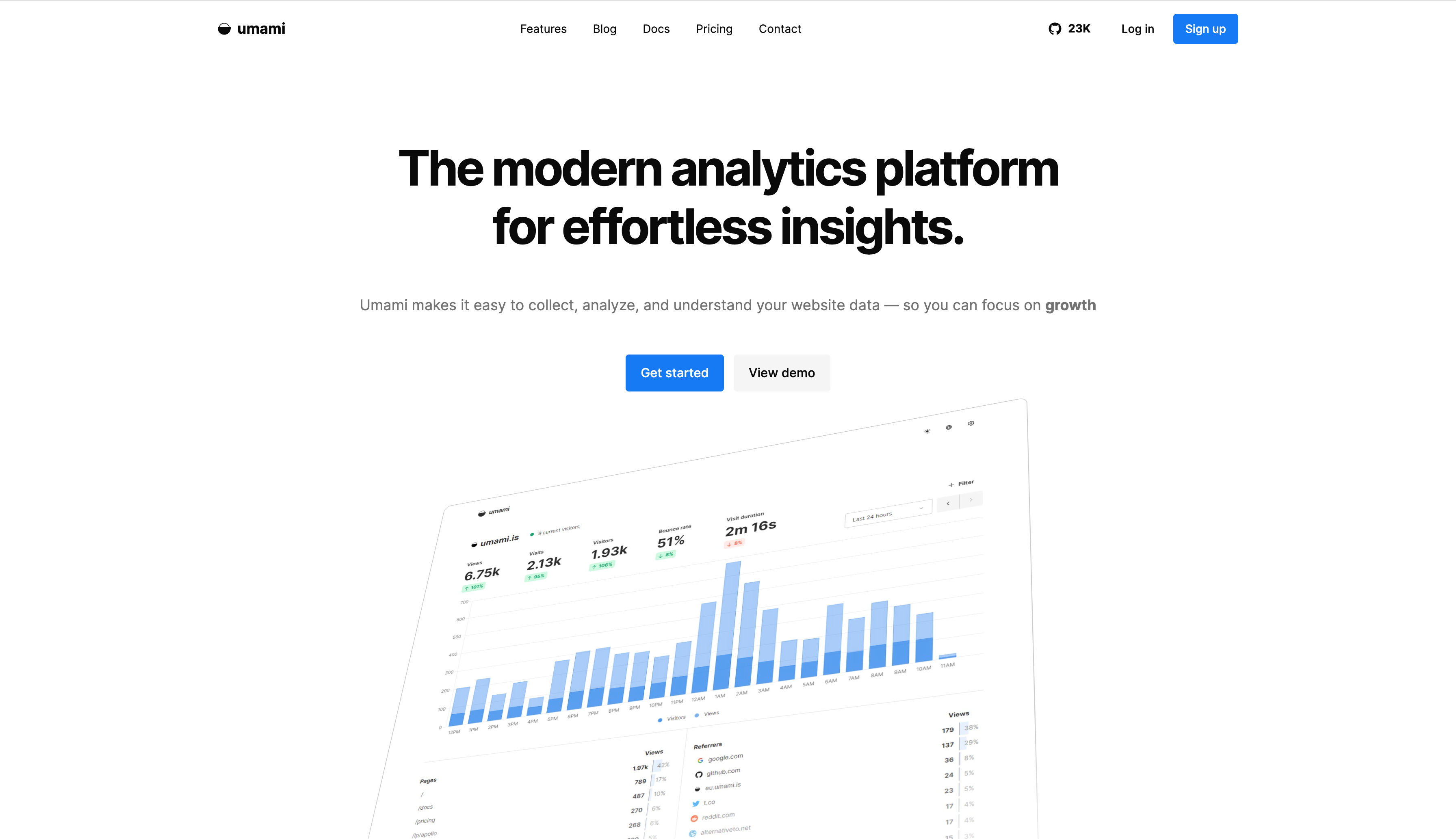
Overview
Umami has emerged as one of the most popular open-source alternatives to Google Analytics. Its philosophy centers around simplicity and privacy, making it an excellent choice for businesses and individuals who prioritize these aspects.
Key Features
- Open Source: Completely free and open-source, allowing for self-hosting
- Privacy-Focused: Collects only anonymous data with no cookies required
- Simple Interface: Clean, intuitive dashboard that presents essential metrics without overwhelming users
- Real-Time Data: View visitor information as it happens
- Custom Events: Track specific user interactions beyond pageviews
- Multi-Site Support: Track multiple websites from a single dashboard
Pricing
- Self-Hosted: Free (you only pay for your own hosting costs)
- Cloud Hosted: Starting at $9/month for the basic plan
Best For
Umami is ideal for developers, small to medium-sized businesses, and privacy-conscious website owners who want a straightforward analytics solution without the complexity of Google Analytics.
What Sets It Apart in 2025
In 2025, Umami has strengthened its position by expanding its API capabilities and introducing more advanced visualization tools while maintaining its commitment to simplicity and privacy. The growing community around this open-source tool has also contributed to its stability and feature expansion.
2. Plausible Analytics
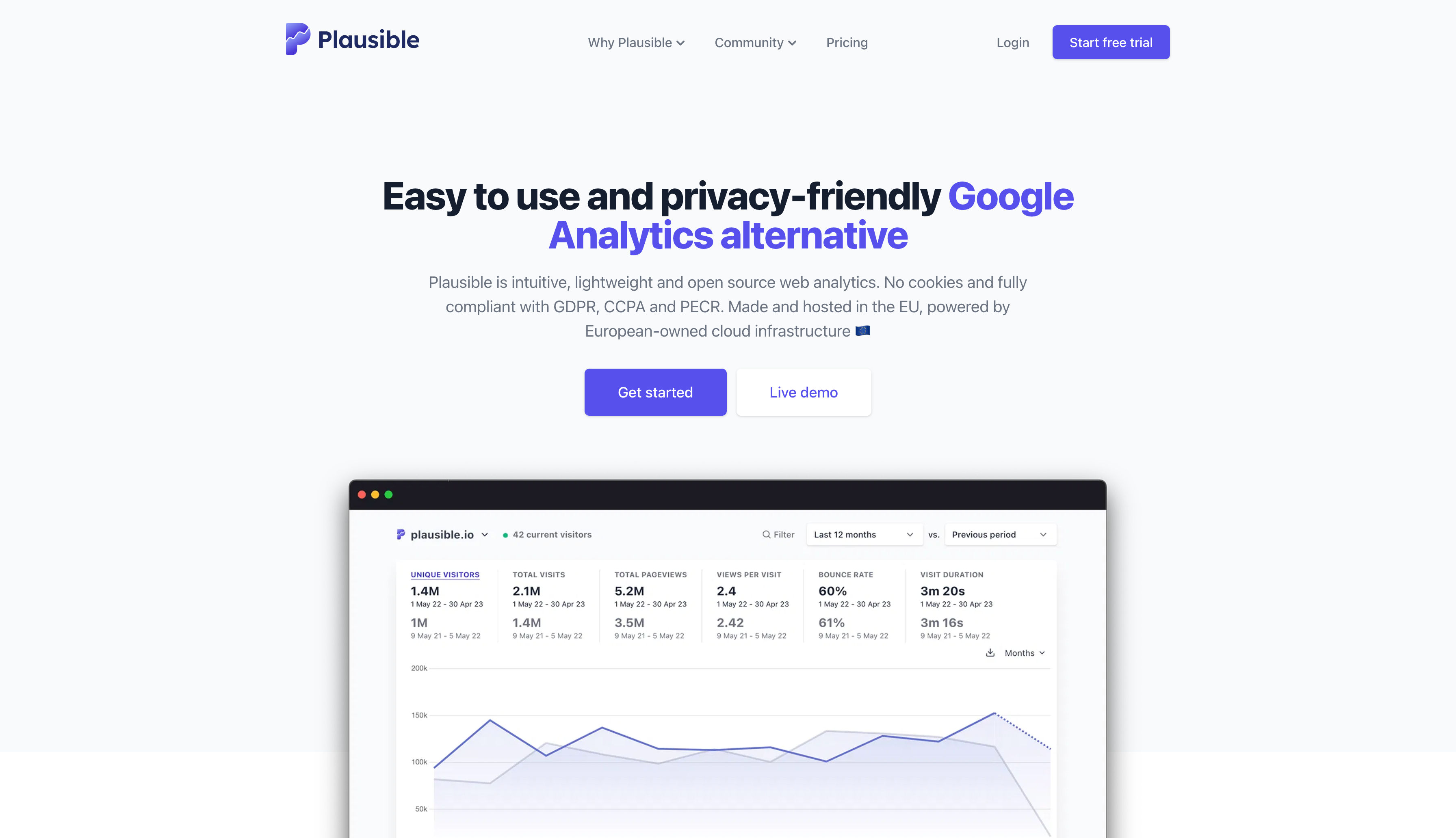
Overview
Plausible has gained significant traction as a lightweight, privacy-friendly analytics solution. Founded with a mission to provide a more ethical alternative to traditional analytics, Plausible has become a favorite among privacy-conscious website owners.
Key Features
- Lightweight Script: Less than 1KB in size, significantly smaller than Google Analytics
- GDPR, CCPA, and PECR Compliant: Built with privacy regulations in mind
- No Cookies: Operates without cookies or collecting personal data
- Simple Dashboard: Easy-to-understand metrics on a single page
- Email Reports: Automated weekly or monthly reports
- Open Source: Transparent code available for review
- Custom Events: Track specific user interactions
Pricing
- Based on monthly pageviews, starting at $9/month for up to 10,000 pageviews
- Annual discounts available
Best For
Plausible is perfect for bloggers, small businesses, and organizations that need simple analytics without privacy concerns. It’s particularly well-suited for European businesses that must strictly adhere to GDPR.
What Sets It Apart in 2025
By 2025, Plausible has enhanced its data visualization capabilities and expanded its integration ecosystem while maintaining its core principles of privacy and simplicity. The platform now offers more advanced segmentation options without compromising on its lightweight nature.
3. Simple Analytics
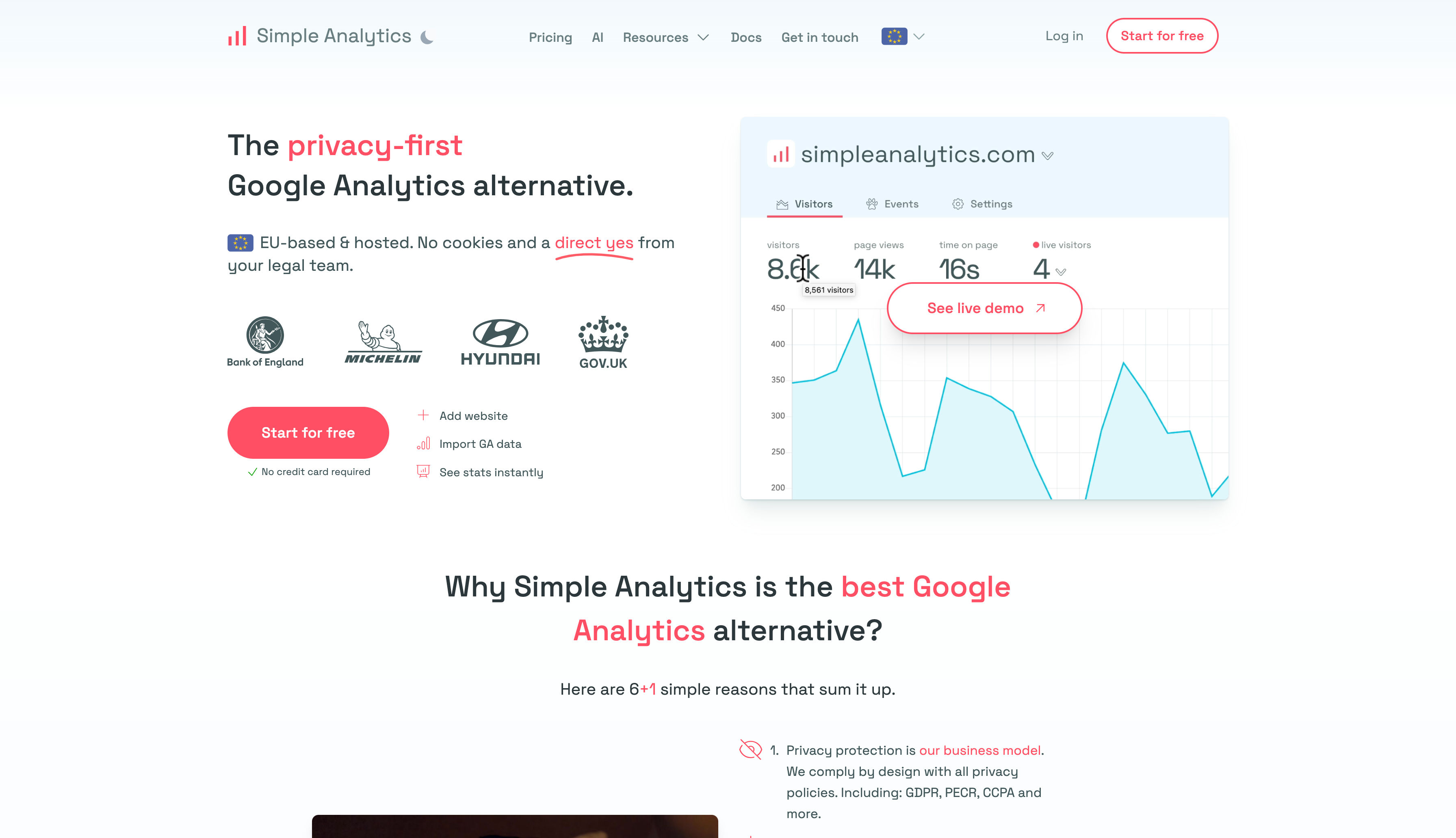
Overview
As the name suggests, Simple Analytics focuses on providing straightforward analytics without the complexity. The platform was built with a “privacy by design” approach, making it an excellent choice for those who want clean, easy-to-understand data.
Key Features
- Privacy-First: No personal data collection or cookies
- Simple Interface: Clean, intuitive dashboard
- Tweet Referrals: Track which tweets drive traffic to your site
- Custom Events: Track conversions and events
- Data Ownership: You fully own your analytics data
- Export Options: Easy data export in various formats
- Bypass Ad-Blockers: Alternative domain option to reduce ad-blocker impact
Pricing
- Starting at $19/month for up to 100,000 page views
- Business and Enterprise plans available for higher volumes
Best For
Simple Analytics is ideal for businesses and individuals who value data ownership and privacy while needing clean, actionable insights without overwhelming complexity.
What Sets It Apart in 2025
In 2025, Simple Analytics has introduced more advanced user flow visualization tools and enhanced its API capabilities, making it more versatile for developers. The platform has also expanded its integration options with popular CMS and e-commerce platforms.
4. Fathom Analytics
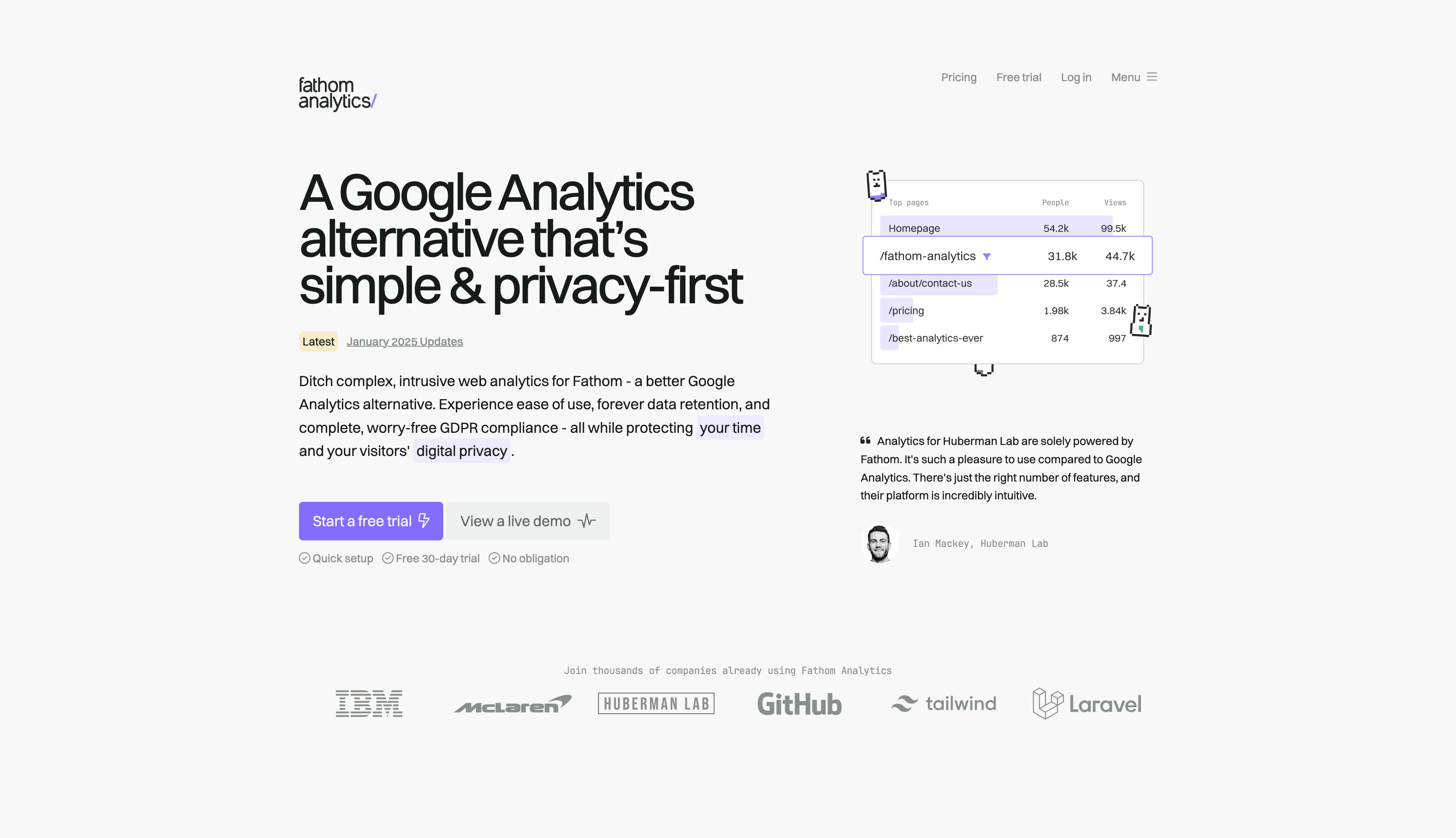
Overview
Fathom has established itself as a premium privacy-focused analytics solution that provides comprehensive insights without compromising user privacy. Their tagline “Simple analytics for ethical websites” encapsulates their approach.
Key Features
- Privacy-Focused: No personal data collection, fully GDPR compliant
- Fast Loading: Lightweight script that won’t slow down your site
- Ad-Blocker Bypass: Unique system to ensure accurate tracking
- Uptime Monitoring: Get alerted if your site goes down
- Custom Domains: Use your own domain for the analytics script
- Goal Tracking: Monitor specific actions and conversions
- Shareable Dashboards: Create public or password-protected dashboards
Pricing
- Starting at $14/month for up to 100,000 page views
- Custom enterprise plans available
Best For
Fathom is excellent for businesses of all sizes that need reliable, privacy-compliant analytics with premium features and support. It’s particularly well-suited for professional bloggers, content creators, and e-commerce sites.
What Sets It Apart in 2025
By 2025, Fathom has expanded its feature set to include more advanced marketing attribution models while maintaining its strict privacy standards. The platform now offers enhanced e-commerce tracking capabilities and has introduced AI-powered insights that respect user privacy.
5. Seal Metrics
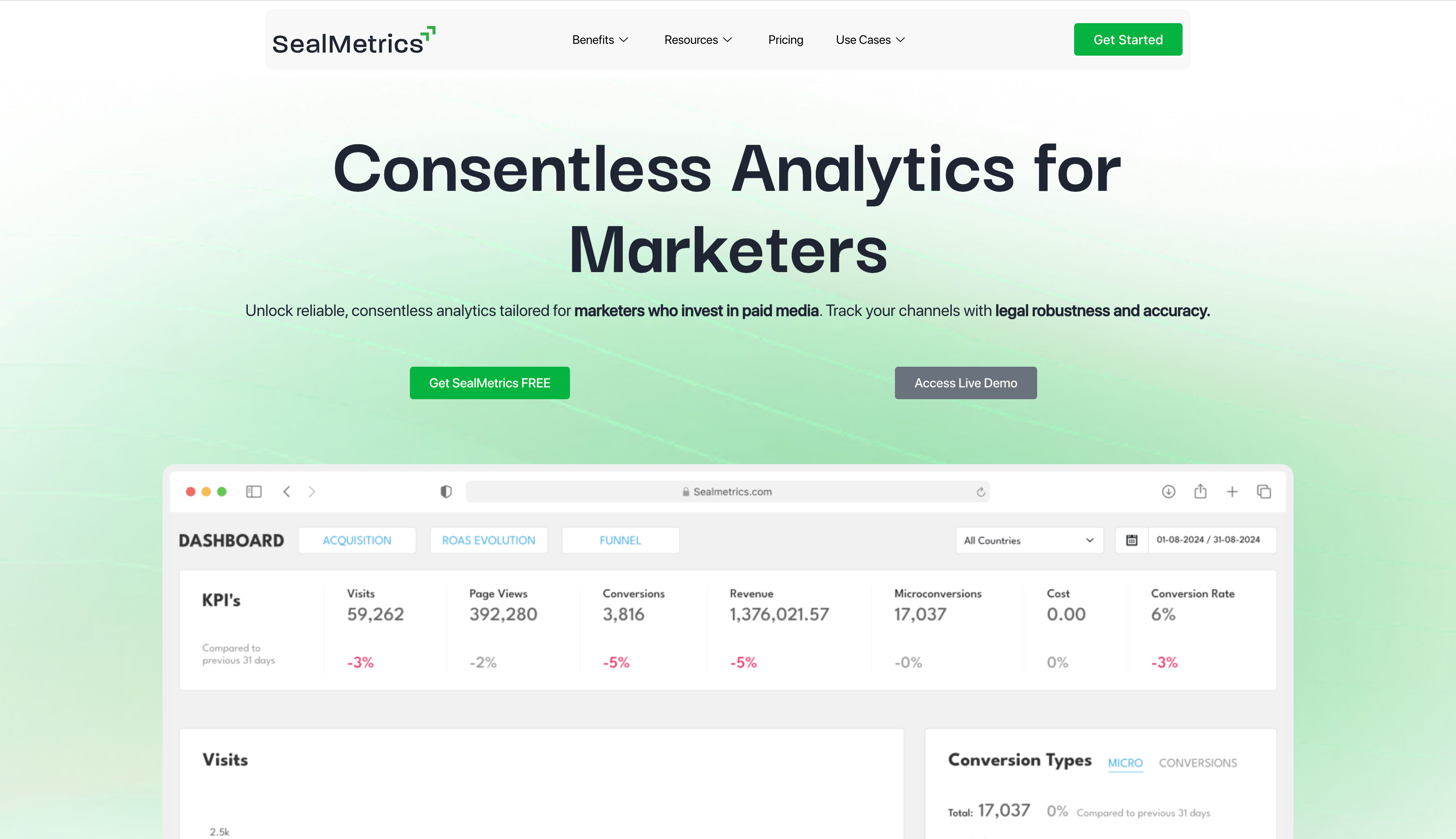
Overview
Seal Metrics is a relatively newer player that has quickly gained popularity for its balance of comprehensive features and privacy-conscious approach. It offers a fresh perspective on analytics with a focus on actionable insights.
Key Features
- Privacy-Compliant: GDPR, CCPA, and PECR compliant by design
- Cookieless Tracking: No cookies required for basic analytics
- Conversion Funnels: Visualize and optimize user journeys
- Heatmaps: Understand how users interact with your pages
- A/B Testing: Built-in testing capabilities
- User Feedback: Collect and analyze user feedback directly
- Integration Ecosystem: Connect with popular marketing tools
Pricing
- Starting at $12/month for up to 10,000 monthly visitors
- Team and Enterprise plans available with additional features
Best For
Seal Metrics is ideal for growth-focused businesses that need more than basic analytics but still prioritize user privacy. It’s particularly useful for marketing teams that need conversion optimization tools.
What Sets It Apart in 2025
In 2025, Seal Metrics has distinguished itself with advanced predictive analytics features that don’t compromise privacy. The platform now offers sophisticated audience segmentation tools and has developed unique insights for content optimization based on engagement patterns.
6. Pirsch Analytics
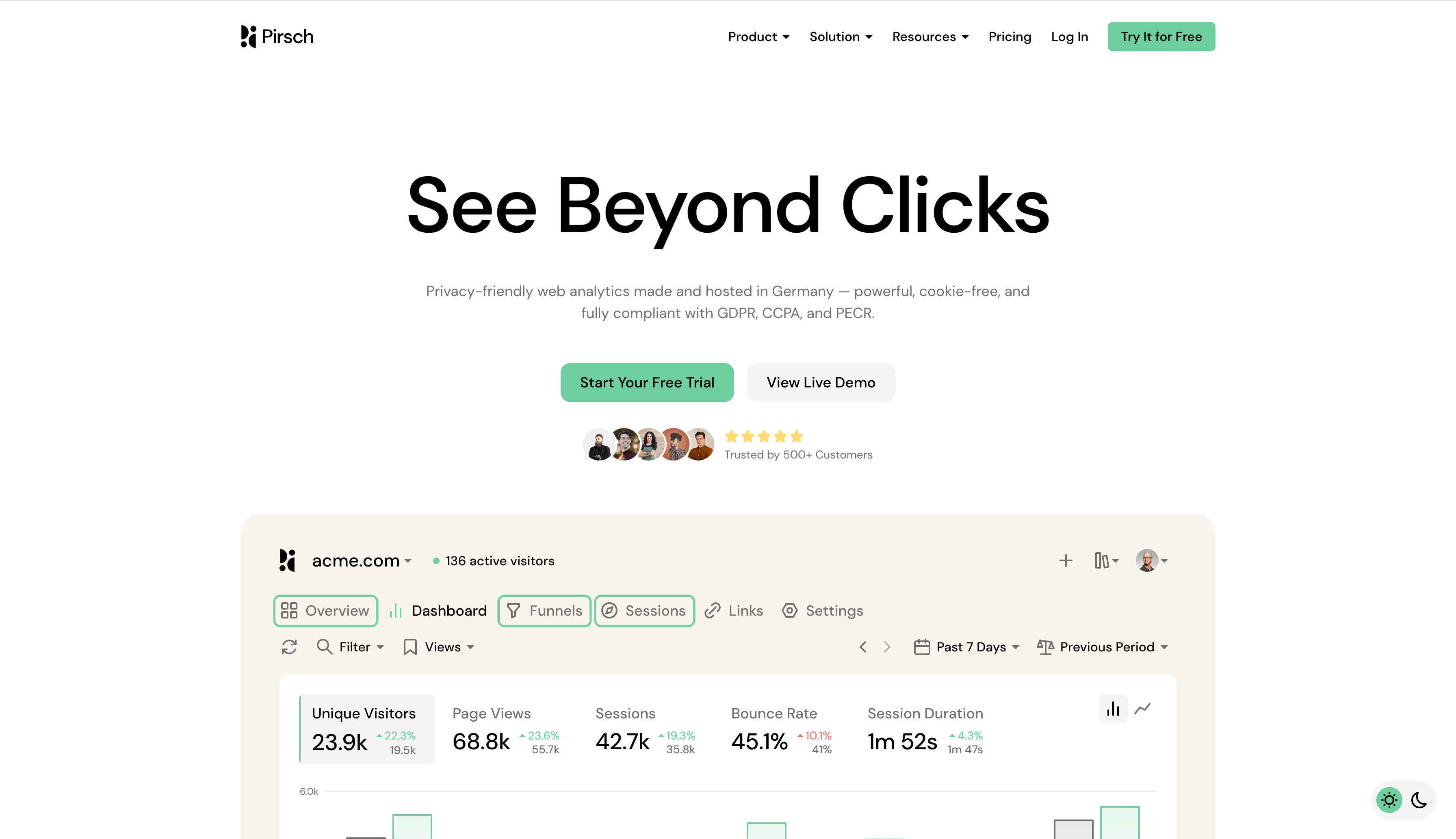
Overview
Pirsch has carved out a niche as a developer-friendly, privacy-focused analytics platform. With its lightweight approach and powerful API, it offers a compelling alternative for technically-minded users.
Key Features
- Cookie-Free: Uses a privacy-friendly fingerprinting technique
- Developer-Focused: Comprehensive API and integration options
- Lightweight Script: Minimal impact on page load times
- Detailed Metrics: Provides in-depth data while respecting privacy
- Custom Events: Track specific user interactions
- UTM Parameter Tracking: Monitor marketing campaign performance
- White-Label Option: Rebrand the dashboard for client use
Pricing
- Free plan available with limited features
- Paid plans starting at $7/month for up to 10,000 pageviews
- Enterprise options available
Best For
Pirsch is perfect for developers, technical marketers, and businesses that need flexible analytics with strong API capabilities. It’s also well-suited for agencies managing multiple client sites.
What Sets It Apart in 2025
By 2025, Pirsch has enhanced its developer ecosystem with more comprehensive SDKs and has introduced advanced data visualization tools. The platform now offers specialized analytics features for single-page applications and has improved its real-time capabilities.
7. UserMaven
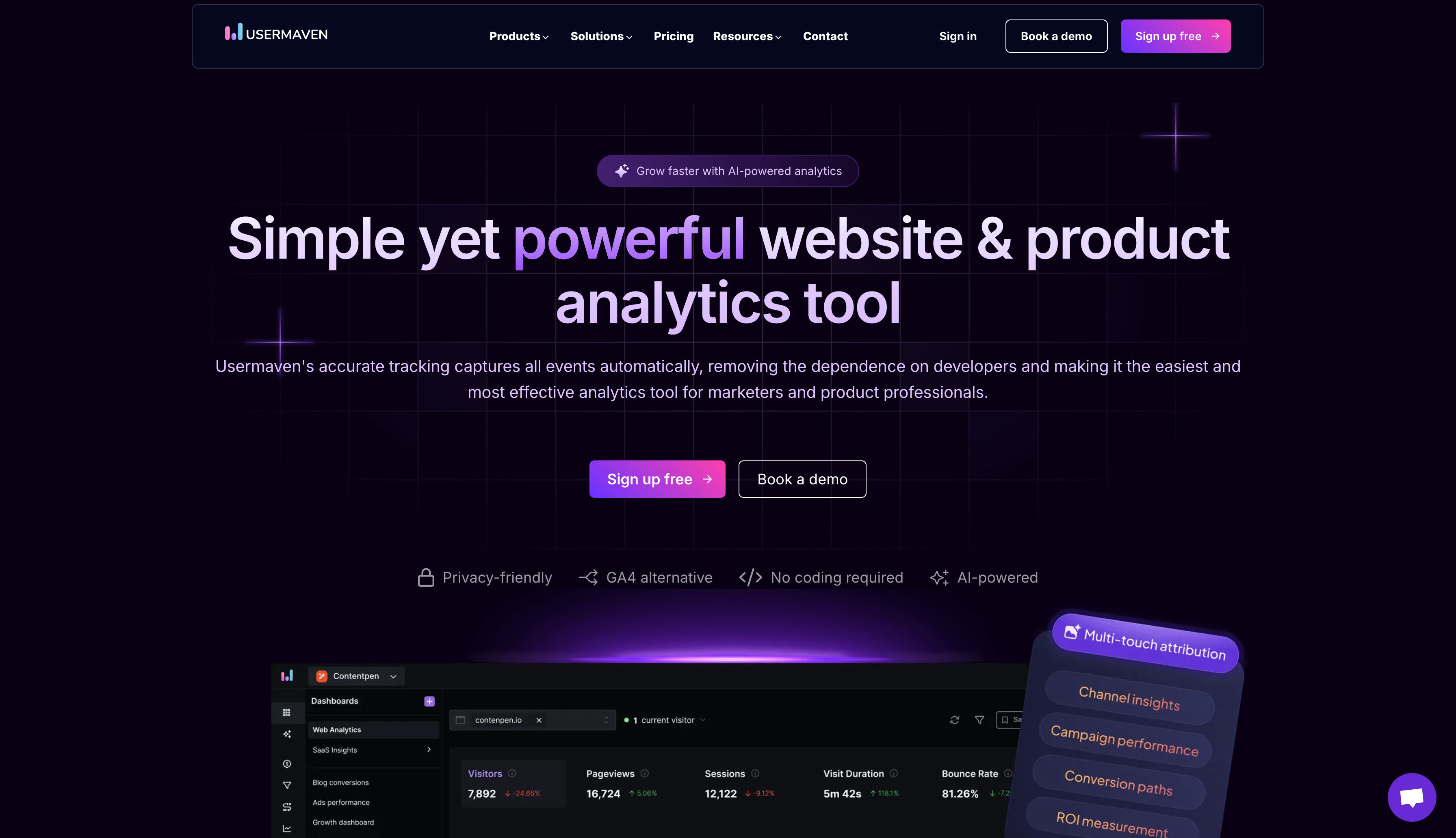
Overview
UserMaven represents the new generation of product analytics platforms that combine privacy compliance with powerful product insights. It focuses on helping businesses understand user behavior to improve product experiences.
Key Features
- Product Analytics: Specialized in tracking product usage and user journeys
- Privacy-Compliant: Built with privacy regulations in mind
- User Segmentation: Advanced user grouping based on behavior
- Retention Analysis: Track how well you retain users over time
- Feature Adoption: Monitor how users adopt new features
- Session Recordings: Optional feature to see how users interact with your product
- Integration Capabilities: Connect with your product stack
Pricing
- Starting at $19/month for up to 10,000 monthly tracked users
- Scale and Enterprise plans available for larger products
Best For
UserMaven is ideal for SaaS companies, product teams, and digital businesses that need to understand user behavior in depth while maintaining privacy compliance.
What Sets It Apart in 2025
In 2025, UserMaven has established itself as a leader in privacy-compliant product analytics by introducing AI-powered user journey optimization tools. The platform now offers predictive churn analysis and has developed sophisticated feature impact assessment capabilities.
Comparison Table
| Platform | Privacy Focus | Pricing Starts At | Best For | Standout Feature |
|---|---|---|---|---|
| Umami | High | Free (self-hosted) | Developers, SMBs | Open-source flexibility |
| Plausible | Very High | $9/month | Privacy-conscious sites | Ultra-lightweight script |
| Simple Analytics | Very High | $19/month | Data ownership advocates | Clean, distraction-free insights |
| Fathom | High | $14/month | Professional content creators | Premium support and reliability |
| Seal Metrics | High | $12/month | Growth-focused businesses | Conversion optimization tools |
| Pirsch | High | $7/month | Developers, agencies | Strong API capabilities |
| UserMaven | Medium-High | $19/month | SaaS and product teams | Product-specific insights |
How to Choose the Right Google Analytics Alternative
When selecting an analytics platform to replace Google Analytics, consider these factors:
- Privacy Requirements: How important is user privacy to your business and audience?
- Technical Complexity: Do you need a simple solution or advanced features?
- Budget: What can you afford to spend on analytics monthly or annually?
- Data Ownership: How important is it that you fully own and control your data?
- Specific Needs: Do you need specialized features like heatmaps or session recordings?
- Integration Requirements: What other tools does your analytics need to work with?
- Scalability: Will the solution grow with your business?
Making the Transition
Switching from Google Analytics to an alternative doesn’t have to be difficult. Here’s a simple process to follow:
- Run in Parallel: Install your new analytics platform alongside Google Analytics
- Compare Data: Check that the new platform is capturing data accurately
- Set Up Custom Events: Recreate any important custom events or goals
- Update Reporting: Adjust your reporting processes to use data from the new platform
- Team Training: Ensure your team understands how to use the new dashboard
- Remove Google Analytics: Once you’re comfortable with the new solution, remove Google Analytics
Conclusion
As we navigate through 2025, the analytics landscape continues to evolve with a stronger emphasis on privacy, simplicity, and actionable insights. While Google Analytics remains a powerful tool, these seven alternatives offer compelling reasons to consider a change.
Whether you prioritize open-source flexibility with Umami, extreme privacy with Plausible or Simple Analytics, premium features with Fathom, growth tools with Seal Metrics, developer-friendly options with Pirsch, or product-specific insights with UserMaven, there’s an alternative that can meet your specific needs.
The future of web analytics is moving toward a more balanced approach that respects user privacy while still providing the insights businesses need to grow and improve. By exploring these alternatives, you’re taking a step toward that future.

